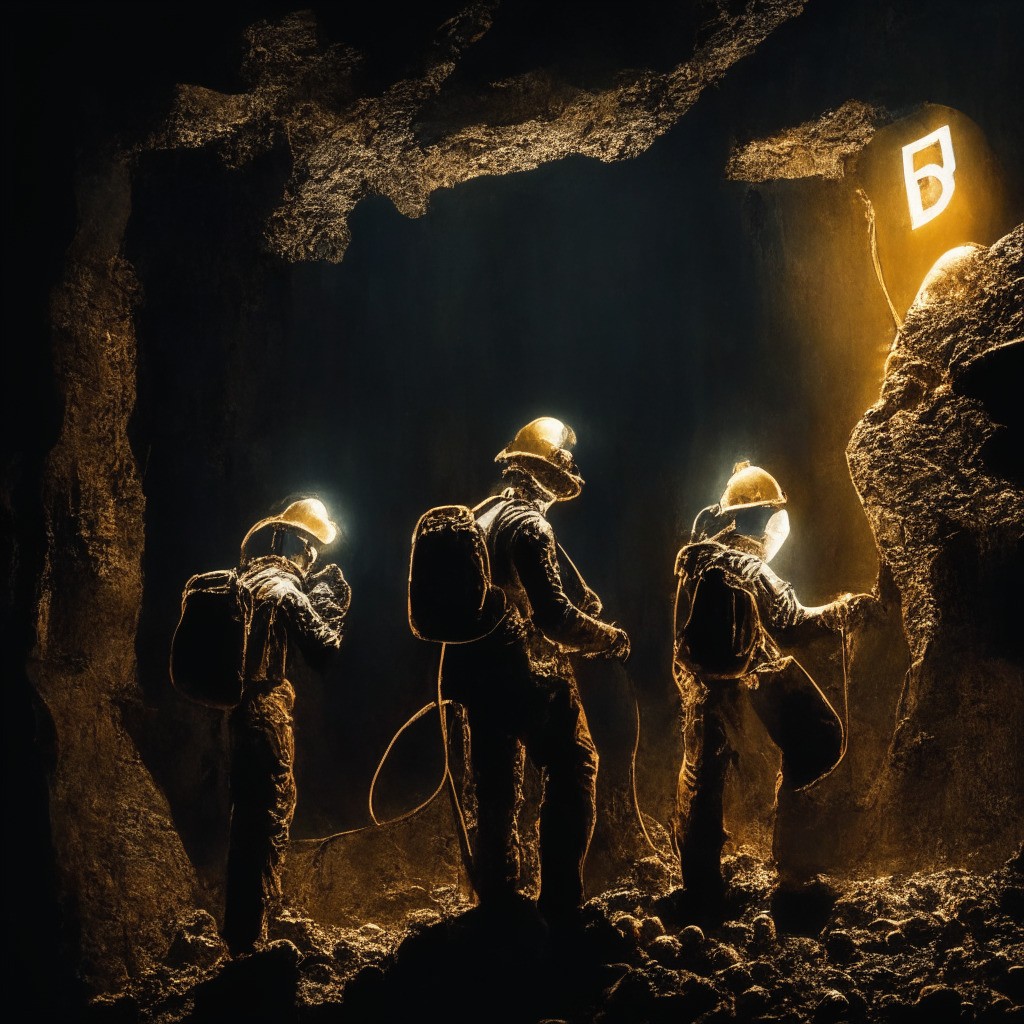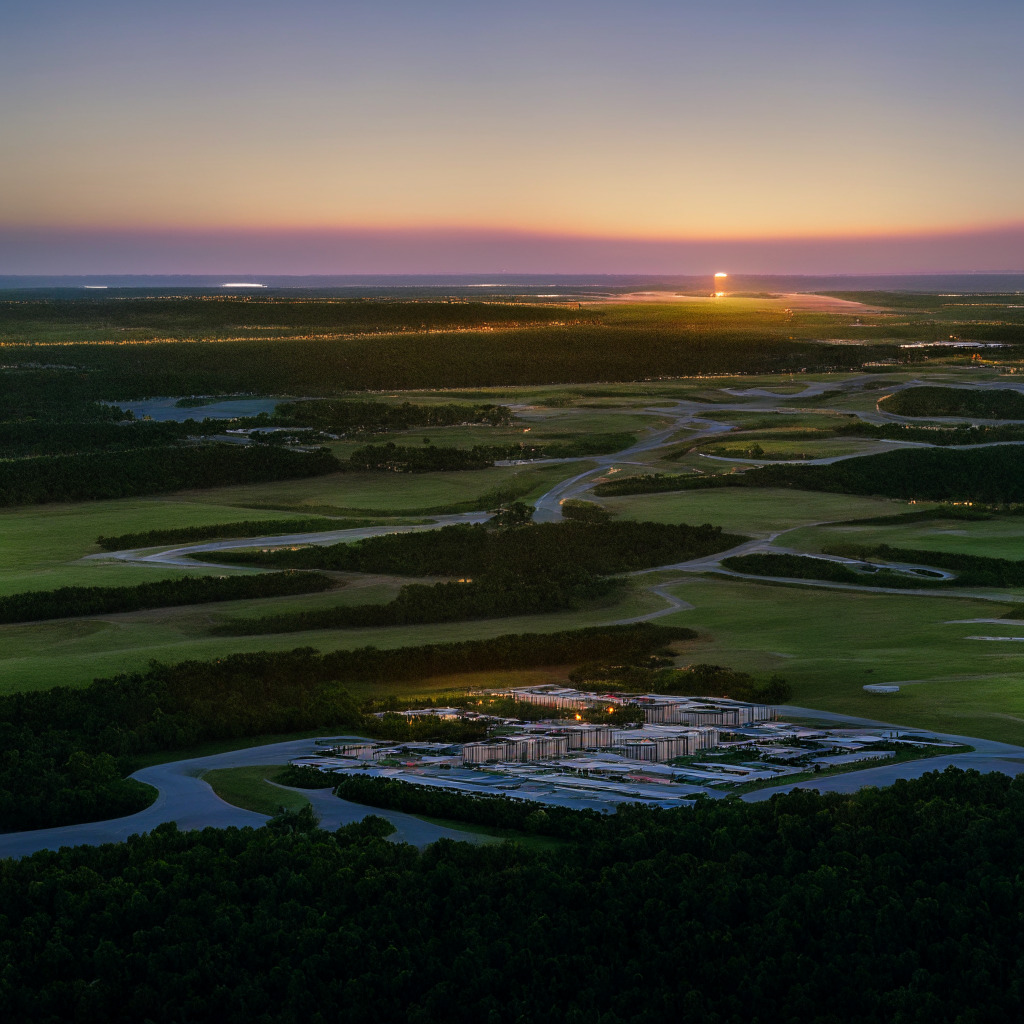“El Salvador introduced the Lava Pool project, merging renewable geothermal energy with cryptocurrency mining, in a strategic blend of Volcano Energy’s infrastructure and Luxor Technology’s expertise to counter environmental concerns of digital currencies. It signifies El Salvador’s determination to integrate Bitcoin into its power infrastructure, becoming the first geothermally driven Bitcoin mining pool in the country.”
Search Results for: Bitcoin-mining
El Salvador’s Volcano Energy: Disrupting Crypto Mining with Renewable Power and Risking It All
El Salvador partners with Luxor Technology, with support from Tether, for its first renewable energy Bitcoin mining operation through Volcano Energy. This ambitious billion-dollar project aims to make El Salvador a powerhouse in renewable energy and Bitcoin mining. However, inherent challenges and critics question the appropriateness of using renewable energies for crypto mining.
Beacon or Blunder: Analyzing Marathon’s Invalid Bitcoin Block Mining Experiment
In a recent development, Bitcoin mining company, Marathon Digital, admitted to creating an invalid Bitcoin block, purportedly as part of an experimental operational optimization. While this initially raised concerns over potential vulnerabilities within Bitcoin’s network, it notably showcased Bitcoin’s robust security, which efficiently neutralized the invalid block.
Unraveling Bitcoin Mining: Environmental Hazard or Green Energy Catalyst?
“Fascinating revelations suggest that Bitcoin mining now leads as the most sustainably-powered global industry, with over half of its energy from renewable sources. Despite criticism, research shows a 38% increase in sustainable energy adoption, surpassing other sectors, including banking.”
Texas Surges Ahead: Altering the Landscape of US Crypto-Mining
“The state of Texas is now claiming a staggering 28.50% of the U.S. crypto-mining hashrate, up from 8.43% at the end of 2021. This rise, attributed to favorable conditions including negative pricing, comes at the expense of states like Georgia, previously a blockchain leader. Meanwhile, Texas’ mining growth draws in leading crypto entities keen on expansion.”
Unearthing Hidden Bitcoin Mines in Venezuelan Prisons: Economic Boon or Bane?
In a recent Venezuelan police operation, undisclosed Bitcoin mining activities were discovered within a notorious prison. This reflects the growing popularity of crypto mining in the country, despite authorities’ efforts to curb these activities due to their high power demand and resultant socio-economic complexities. The event highlights the conflict between security, sustainability, and economic growth in the crypto realm.
Can Bitcoin Mining actually aid in Reducing Global Carbon Emissions?
The Institute of Risk Management (IRM) study suggests Bitcoin mining could contribute to reducing global carbon emissions by potentially reducing up to 8% of global carbon emissions by 2030, countering traditional narratives about Bitcoin’s negative environmental impact. However, the expanding energy-intensive crypto mining industry also highlights the balance needed between ecological preservation and technological progression.
Unveiling Blockchain’s Future: A Horizon of Opportunities Amidst Uncharted Risks
“The future of blockchain, while trending, remains uncertain. Despite blockchain’s potential to challenge traditional finance systems with its transparency, security, and speed, concerns such as volatility, regulation, misuse, and environmental impact add layers of skepticism to predictions.”
Turnaround Tale: Core Scientific’s Multimillion-Dollar Deal with Bitmain Amid Bankruptcy
“Core Scientific announced a multimillion-dollar deal with Bitmain, including $23.1 million worth of mining servers and a $53.9 million investment into their shares. The funds aim to boost the North American mining sector, balance Bitmain’s operations, and expand Core’s fleet in preparation for Bitcoin’s next halving. The partnership also demonstrates resilience amidst Core Scientific’s bankruptcy case.”
Cryptocurrency Mining and Environmental Dilemma: Panther Creek Power Plant Under Fire
“Panther Creek Power Plant in Pennsylvania, purchased by Stronghold Digital Mining, has come under criticism for its energy-intensive crypto mining practices. Despite environmental concerns, the plant seeks approval for burning tires to generate energy for crypto mining. The situation highlights the conflict between the high energy demands of crypto mining, environmental preservation, and the search for affordable energy sources.”
Exploring the Political Spectrum: The Rising Influence of Bitcoin Mining and Cryptocurrencies
Senator Ted Cruz endorses Bitcoin, highlighting its potential in bolstering energy grid resilience—an advantage in emergencies, such as the recent Texas extreme weather. The stance reflects the growing influence of digital currencies, despite potential hurdles and economic turbulence.
Mining Uncertainties: How Weather Influenced Marathon’s Bitcoin Production in August
“Marathon’s August Bitcoin mining rate slid 9% due to unfavorable weather conditions, yet showed a fivefold increase from August 2022. Despite environmental challenges, the US-based crypto mining operator is pursuing growth targets and new facilities, underlining both the potential rewards and inherent volatility of the cryptocurrency industry.”
Debunking the Myth: The Real Energy Consumption of Bitcoin Mining
“The Bitcoin Electricity Consumption Index (CBECI) has significantly adjusted its original estimates of cryptocurrency’s energy appetite. It now suggests Bitcoin network’s total energy consumption is more comparable to US tumble dryers usage. This shift is due to the realization that older mining machines are being decommissioned quicker than predicted.”
Bitcoin Mining: A Hidden Champion in Green Energy Revolution or Grid Nightmare?
Bitcoin miners, against popular belief, are actually evolving to become beneficial players in grid optimization and the ongoing green transition. They leverage underutilized renewable energy sources, partake in grid-flexibilization initiatives and provide a unique capability for swift power usage adjustments. They suggest new strategies for energy-intensive industries to navigate the renewable energy landscape.
Unleashing Bitcoin Mining: The Untapped Catalyst for America’s Green Energy Transformation
“Bitcoin mining could potentially revolutionize America’s energy landscape by generating green, efficient, renewable, zero-emission energy sources. It makes unprofitable ventures profitable, enhances our energy grid’s efficiency, helps manage load, and contributes to a sustainable energy-conscious culture.”
Unmasking Mystery: Unraveling the Intrigue Surrounding Tether’s Cryptic Bitcoin Mining Operations
Tether’s CTO, Paolo Ardoino, recently sparked interest about the company’s mysterious Bitcoin mining operation, located in Latin America. Despite offering some details, skepticism around the mining site’s exact location and legitimacy has roused due to Ardoino’s hesitant transparency. This brings into focus the crucial balance between physical security and the crypto community’s need for transparency, shaping the future of Blockchain applications.
Bitcoin’s Rising Mining Difficulty: Potential Price Surge and Market Impact
“The Bitcoin mining difficulty recently hit an all-time high of 55.62 trillion hashes. This difficulty, adjusted every two weeks, affects mining speed and is tied to Bitcoin’s network computational power. High mining difficulty could push prices up as miners anticipate a Bitcoin value rebound and invest more resources into mining.”
Navigating the Crypto Winds: The Highs, Lows and Ambiguities in Blockchain’s Future
“Unstoppable Domains has unveiled Unstoppable Messaging, a product of the Web3 messaging network XMTP. Meanwhile, Binance.US has paired with MoonPay to allow customers to convert USD into tether (USDT) amidst their comeback from a dollar deposit suspension. Despite advancements, cybersecurity challenges persist in the blockchain world.”
Exploring the Resilience of Bitcoin: Unfazed Miners Amid Market Dips
Despite the recent Bitcoin price dip, miners continue to thrive ascertain by on-chain data. The downturn in BTC/USD dropping 10% hasn’t deterred them, as reflected in the Bitcoin mining difficulty hitting record highs. This resilience, alongside growing miner activity and increased network security and reliability signals a possibly undervalued market, presenting a compelling investment opportunity.
Blockchain Under the Dragon: Crypto Future in a Tightening Chinese Regulatory Landscape
“A Chinese government official has received a life sentence due to his involvement in illicit activities, including a Bitcoin mining business. Xiao Yi was found guilty of corruption and the abuse of power. His charges tie back to his relations with Jiumu Group Genesis Technology. The company operated a significant number of Bitcoin mining machines and consumed around 10% of Fuzhou city’s electricity. Yi’s sentence highlights China’s strict stance on illegal cryptocurrency operations.”
Hydro-Powered Bitcoin Mining: Pioneering the Green Crypto Future or Exacerbating Energy Woes?
Bitcoin mining is moving towards renewable energy, with Genesis Digital Assets Limited opening a hydroeletricity-powered data center in Sweden. This reflects a trend, proving that Bitcoin mining and clean, renewable energy can coexist, which potentially addresses the industry’s environmental concerns.
Unveiling Moria: The Stakes of Analytical Tools in Bitcoin Mining’s Future
Tether’s CTO, Paolo Ardoino, highlights the need for improved analytical tools in Bitcoin mining. The potential software, named “Moria” aims to use data analytics to enhance mining operations, with a particular focus on harnessing renewable energy. However, the role of such advanced analytics could lead to complex challenges, balancing superior efficiency and increased complexity in Bitcoin mining.
Harnessing Green Solutions: How Bitcoin Mining Could Drive Us Towards A Carbon-Neutral Future
“Bitcoin mining’s energy consumption has raised environmental concerns. However, recent innovations like flare gas solutions and nuclear energy are promising enhancements. Harnessing flare gas, an underused resource, for mining operations could drive a carbon-neutral era. Further potential lies in microgrids and nuclear power, despite safety and regulatory concerns. All these seek to incentivize blockchain use beyond Bitcoin mining, significantly reducing the industry’s carbon footprint.”
Bitcoin Mining Giants Take the Green Leap: Genesis Digital Assets Expands in South Carolina
Genesis Digital Assets (GDA) inaugurated three eco-friendly data centers in South Carolina, contributing to over 2% of the total Bitcoin network hash rate. These expansions notably utilize local energy resources, strengthen local energy grids, and align with GDA’s clean energy ethos, potentially leading crypto mining towards a more sustainable, eco-friendly future.
Unraveling Russia’s Bitcoin Mining Boom: Economic Incentives and Geopolitical Pressures
Despite international sanctions following Russia’s invasion of Ukraine, the country’s bitcoin mining industry is booming due to low-cost energy and a cold climate. However, businesses operating there face risks including prohibited associations with sanctioned entities and potential reputational damage. Interestingly, this doesn’t discourage foreign companies; Russia’s economic advantages and Ordinals project-enhanced blockchain activity keep improving the country’s mining conditions.
Shaping the Future of Renewable Energy: The Unforeseen Role of Bitcoin Mining
“Bitcoin mining appears as an unexpected solution to the ‘duck curve’ – mismatch of peak energy demand and production times. By absorbing excess energy during high production periods, Bitcoin miners help balance grid management, enhancing profitability of renewable infrastructure and contributing to a sustainable future.”
Navigating the Bitcoin Halving: A Crossroads for Miners Between Efficiency and Survival
“The expected Bitcoin halving event in April 2024 could cause a 30% drop in Bitcoin’s computational force, potentially making mining unprofitable for many. Miners could mitigate this by deploying new-generation machines that require less power, thus reducing operating costs.”
Balancing Act: Decentralization, Mining Centralization, and the Future of Blockchain Technology
“This article explores the potential pitfalls of Bitcoin’s proof-of-work system, highlighting mining centralization and the economic imbalance it can cause. It encourages a shift towards alternative consensus mechanisms to align incentives between miners and users, maintaining blockchain’s promise of financial democracy.”
Redefining the Bitcoin Energy Monster: Role of ASICs in Boosting Efficiency and Profits
“Bitcoin’s perceived high energy usage could be overstated due to significant increases in mining efficiency over the past five years, notably with ASIC miners. Coin Metrics’ revealed a 63% reduction in energy usage for comparable work, highlighting a shift in energy consumption narrative and potential for higher miner returns.”
Decoding the Environmental Paradox of Bitcoin Mining: Unexpected Green Revolution
“Bitcoin miners solidify energy grids’ resistance, promote renewable energy, and respond with precision to grid frequency situations. They provide benefits like utilizing stranded energy during low demand periods and actively supporting renewable energy infrastructure investment. This promotes a greener energy mix and mitigates inefficiencies.”
Unveiling Bitcoin’s Enigmatic Role in Climate Change: A Boon or a Bane?
Bitcoin mining contributes only 0.14% of total global emissions, and isn’t likely to significantly promote renewable energy growth or help meet decarbonization targets. However, it plays a part in promoting sustainable development, mitigating methane emissions and potentially turning mining revenue into a subsidiary factor in broader energy operations.
Navigating the Bitcoin Mining Labyrinth: Texas’ Struggle between Economy and Ecology
“Texas, a significant bitcoin mining hub, is experimenting with integrating mining into power grids. However, this move has been criticized for potentially prioritizing an environmentally harmful industry over local communities. On the other hand, supporters highlight the potential grid benefits and job opportunities, but concerns about sustainability and water usage persist.”






























